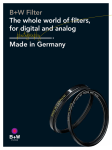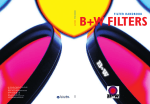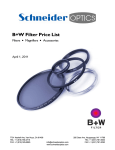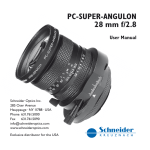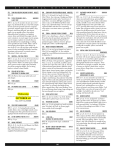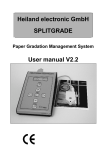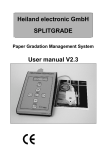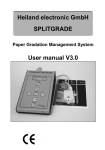Download B+W 30.5E INFRARED (092)
Transcript
B+W FilTeRS FoR diGiTAl PHoToGRAPHY Soundsolinsen 4 10 12 14 CONTENTS 60 YEARS OF B+W FILTERS: HIGH TECH MADE IN GERMANY Page 4-7 16 PROTECTION FILTERS Clear, UV Page 8 POLARIZING FILTERS Käsemann, Circular Polarizing Filter Page 10 GRAY FILTERS Page 12 CLOSE-UP LENSES Macro Lens Page 14 EFFECT FILTERS Soft Focus Filters Page 16 18 Gray Graduated Filter and Redhancer Page 18 SPECIAL FILTERS Infrared, Digital UV/IR Blocking Filter Page 20 MOUNT TYPES Page 22 ACCESSORIES Page 24-26 20 FILTERS/LENS HOODS Table Page 28 WIDE-ANGLE FILTERS Table Page 30 60 YeARS oF B+W FilTeRS: HiGH TeCH MAde in GeRMAnY WHen iT CoMeS To TeCHnoloGY PRoduCTS, A 60-YeAR CoMPAnY HiSToRY iS CoRRoBoRATion oF ReCoGniZed ToP QuAliTY. CoMPReHenSiVe KnoW-HoW And STATe-oF-THe-ART PRoduCTion TeCHnoloGY HAVe MAde A nAMe FoR THe PRoVeRBiAl B+W FilTeR QuAliTY oF SCHneideRKReuZnACH THRouGHouT THe WoRld. B+W FilTeRS AlSo PeRFoRM CReATiVe TASKS in diGiTAl PHoToGRAPHY. iMPRoVinG PHoToGRAPHiC ReSulTS WiTHouT TouCHinG THe dATA ReCoRd CAn onlY Be done WiTH FiRST-ClASS FilTeRS. THe nAMe B+W GuARAnTeeS PeRFeCT iMAGe QuAliTY. innovation and experience “made in Germany” B+W is celebrating its 60th anniversary in 200. Following the merger with Jos. Schneider Optische Werke GmbH In 18, the company moved into its current premises in Bad Kreuznach, having previously been based in Wiesbaden. Under the umbrella of Schneider-Kreuznach a lively technology transfer developed. B+W has succeeded in establishing itself as one the world‘s leading filter manufacturers. It has, for example, made decisive progress in surface coating. B+W is the first filter manufacturer in the world to offer MRC (multi-resistant coating). The world-famous Käsemann-type polarizing filter with its outstanding quality has been produced by B+W since 18. Today, Filter coating under strict clean room conditions state-of-the-art production equipment, precise CNC machines and highly advanced reflection-reducing technology guarantee top quality which is amongst the very best to be found on the world market. B+W filters for better quality in digital photos Particularly in digital photography, B+W filters are important tools for improving image quality. A B+W polarizing filter, for example, provides more saturated colors and high color contrasts because the bluish-gray haze typical of sunny days is filtered before the image sensor generates the data record. If UV or IR radiation causes haze or blur a UV/IR blocking filter in front of the lens can ensure more brilliance and detail sharpness without the necessity for coarsening re-sharpening in the image program. Filters solve problems before they occur in the image sensor. Image-processing programs, on the other hand, cannot conjure up information which is not contained in the data record. Many of the most commonly used color and contrast corrections work by removing image information (destructive image correction). Such, in some cases coarse repairs leave considerable gaps in the data record which are not yet recognizable on the PC monitor, but can become visible on the higher-resolution print. 4 Amplitude-controlled immersion baths – this is how graduated filters are made B+W quality: A brand that keeps its promise Behind the globally recognized B+W filter quality is a continuous process of optimization and quality control which already begins with the raw glass blocks. For the production of the high-precision B+W filters Schott colored glass is used almost exclusively because Schott guarantees the very highest glass quality. In Bad Kreuznach, computer-controlled grinding and polishing machines produce the highest filter quality from this raw material in an impressive range of designs and diameters. Special production processes remain the domain of the optimizing handcraft of experienced specialists. Strict quality checks in all key production steps ensure seamless production standards. B+W quality does not come about by coincidence, but is clearly defined: to manufacture exactly plane-parallel filter discs without arching or wedge errors (deviating thickness) which could lead to partial image blurring. CNC-controlled diamond grinders rounds rectangular glass to form filter discs The filter glass must be completely smooth, because roughness results in scattered light and an unwanted soft focus effect. B+W filter glass meets the highest requirements of camera and lens manufacturers and guarantees optimum imaging quality. B+W is the first filter manufacturer in the world to offer MRC (Multi Resistant Coating). This multi-layer coating is vapor-deposited in highly advanced vacuum coating plants. It is extremely low-reflective and highly resistant to scratching. But above all its unique dirt and water-repellent surface makes cleaning the filters easier. In this way, filters can also perform a protective function for the front lens. The continuous new development and further development of the B+W filter models and the final inspection of each individual filter mean that users can achieve the best possible photographic results. It is therefore important to Filter assembly is performed carefully using torque-controlled equipment give the same consideration to quality when buying a filter as when selecting your lenses. 60 years of know-how guarantee top filter quality to meet global market standards. A brand promise we can be very proud of in Bad Kreuznach. Black hard chrome plating, with reflection-reducing finish Filter mounts – the mechanical specialists The important role played by the filter mount and its mechanically complex task are often underestimated. Although mounts are supposed to fix the high-quality filter glass in position “for life”, they must not cause any sharpness-reducing tension in the glass. B+W manufactures various mount types, mainly out of stable brass, on CNC machines. The filter glass is screwed into a high-precision retaining ring, applying a pre-specified torque. Besides the excellent F-Pro standard mount which is suitable for telephoto lenses up to the most common wide-angle focal lengths, B+W offers the very flat Slim mount for extremely wide angles. This eliminates vignetting. For even more extreme focal lengths there is the Oversized mount on which the filter glass protrudes far beyond the thread of the retaining ring (more under “Filter mounts”). It is the high-grade mounts that finally make a B+W filter a true piece of high tech that you can rely on for many years to come. CNC machines turn brass rods into precision rings Creative filter technology – the fascination of precise creativity Close-up and macro lenses provide a simple way of exploring new motif worlds. With infrared filters you make the invisible visible and create artistic, fabulous images. For high color contrasts that still look authentic a polarizing filter is still the best option, despite the possibilities offered by photo-editing programs. Furthermore, polarizing filters can eliminate many reflections. The B+W Soft Pro filters produce a professional soft focus effect. And for action photography – whether it is sailing or mountain biking – B+W protection filters shield the front elements of expensive lenses from scratches and moisture. Experience the fascination of precise creativity with your digital camera thanks to high-quality B+W filters. By the way: This brochure is only part of our overall program. You will find more filters and tips at: www.schneiderkreuznach.com Brass tubes in storage, the raw material for mounts PRECISION-ENGINEERED MOUNTS THE STABLE BRASS MOUNTS ARE MADE ON HIGH-PRECISION CNC MACHINES. KNURLING ON THE FRONT EDGE ENSURES NON-SLIP HANDLING WHEN ATTACHING AND REMOVING. STRICT QUALITY CONTROLS GUARANTEE EXACT ADHERENCE TO THE TARGET VALUES. PRoTeCTion FilTeRS B+W Protection Filter 007 Clear This filter fulfils the desire of many photographers for pure lens protection without a filter effect. Its only function is to keep dirt, sand or splashes away from the front lens. The extremely clear special glass with high transmission is MRCfinished. The hydrophobic coating reduces the adhesion of particles and water drops. The advantages are easy cleaning and maximum reflection reduction. Also available with Slim mount for super wide angle lenses. B+W Protection Filter uV 010 The classic among the protection filters blocks the unwanted UV component contained in daylight. The invisible UV light occurs more in pure sea air and in the mountains, and can lead to blur and blue cast. The colorless UV filters are suitable for both analog and digital cameras and ensure more brilliant pictures. The can remain permanently on the lens to protect it from dirt and damage. A high-grade MRC finish provides optimum reflection reduction. 8 Protection filters – the lens protectors Active photography demands a great deal of cameras and lenses. It therefore makes sense to protect the sensitive front element of the lens against flying sand, dust, fingerprints and water with a filter. Filters not only cost a fraction of the price of a lens, but are also easier to clean. B+W protection filters can remain permanently in front of the lens as they are absolutely colorless, highly transparent and extremely low-reflective due to their hard MRC finish. The optical information reaches the image sensor (or film) uninfluenced. The filters have no exposure factor. Protection factors play a particularly important role In digital photography. Larger depth of field due to small sensors increases the influence of front lens soiling on image quality. Particularly in zoom lenses with low light intensity, fingerprints have the effect of reducing sharpness considerably. Frequent cleaning of the front lens, however, can not only cause scratching, but also transport dirt particles or moisture on the edge of the mount into the inside of the lens system. UV 010 MRC: Front lens protection and more brilliance UV 010: Filter protection against splashing Multi Resistant Coating with pearl effect To guarantee perfect image quality, filters must be kept clean. This is supported by the hard MRC finish with its dirt and water-repellent pearl effect coating. This is the best way to clean filters: Never rub off dry, loose dirt particles, but remove them first with compressed air (if possible without touching) or a soft lens brush. Breath on the particle-free filter surface and clean it with a soft B+W micro-fiber cleaning cloth. For difficult stains, B+W Lens Cleaner Spray is helpful. Do not use paper tissues as their fibers cling due to electrostatic charges. Little effort for constantly perfect image quality. PolARiZinG FilTeRS B+W “Käsemann” Polarizing Filter For this high-end polarizing filter the foil pieces are selected individually for maximum color neutrality. Following cementing between highgrade optical glass, additional grinding and polishing takes place. This guarantees outstanding sharpness even with very bright, apochromatic lenses. The latest cementing technique ensures lasting stability even in damp climates. Available as linear and circular polar-izing filters. Some circular filters come with MRC. B+W Circular Polarizing Filter The standard circular polarizing filter is equally suitable for both analog and digital cameras. Linear polarization can falsify exposure or AF metering if beams are split inside the camera (by mirrors or prisms). Circular polarization prevents this, while otherwise retaining the same effect. The B+ W Circular Polarizing Filter is highly effective and is available uncoated or with a high-grade MRC finish. 10 Unwanted reflections on glass (right) are removed by the pol filter Without pol filter: Typical gray-blue haze on sunny days With pol filter: Pure, authentic colors, more brilliance Polarizing filters – pure colors and non-reflecting surfaces Radiant white clouds against a deep blue sky or saturated fall colors are no coincidence. Polarizing filters block the bluish gray veil from the diffusely polarized light of the sky. They augment the purity of true colors and increase color saturation. Polarizing filters are amongst the most important filters in (digital) photography. They can be rotated in the mount, allowing the visible regulation of the elimination effect in the viewfinder or on the display. The filter factor is two to three f-stops. The maximum effect is achieved at a shooting angle of 90° to the sun. For an even effect in the picture, 35 mm (or 28 mm in 35 mm film format) should be the minimum. The second beneficial effect of pol filters is the reduction of reflections on non-metallic surfaces (water, shop windows, lacquer). Objects behind these surfaces, including writing behind reflecting lacquer, are made visible. A fascinating way to enhance images without using photo editing. Circular pol filters are recommended for digital cameras. 11 Gray filters – creative using less light Gray filters or neutral density (ND) filters are used if too much light restricts creative possibilities. They reduce the light in accordance with their density. They therefore allow longer exposure times or more widely opened apertures. Applications are highly varied and in some cases experimental. For very bright motifs in the snow or on the beach the aperture would also have to be closed, despite minimum exposure time. This would mean losing the option of short depth of field, e. g. for portraits. This is even more the case with fill-in flash due to the slow synchronization speed. Gray filters can produce wipe effects in movements if the exposure time can be extended with the required aperture. A waterfall then no longer appears to be frozen, but as a flowing motion. Gray filters create ingenious effects in architecture or urban photography. With long exposure times of several hours, people walking through the shot are blurred or not reproduced at all. For physical reasons, very dense filters possess a warm tone which can be compensated in image processing. Without gray filter: Frozen waterfall due to high shutter speed With gray filter: Flowing motion due to low shutter speed Without gray filter: Too much depth of field due to closed aperture With gray filter: Open aperture creates concentrated, selective sharpness 12 GRAY FilTeRS B+W Gray Filter 103 This quite strong gray filter reduces the light by up to three f-stops, equivalent to a filter factor of 8x. It offers more options than weaker gray filters. This is already sufficient for successful time-exposure effects, and it can also be regarded as a universal gray filter in digital photography. White balance with the filter ensures optimum color neutrality. Tip: Remember to use a tripod for longer exposure times. B+W Gray Filter 106 With its light reduction by six f-stops (filter factor 64x) this filter allows even more extreme experiments. This includes time-exposure effects such as light trails or walking people who become blurred or invisible. A physically induced higher red transmission produces a slightly warm tone. If necessary, this can be eliminated by white balance or an image program. 1 CloSe-uP lenSeS B+W Close-up lens nl 4 With +4 diopters this close-up lens is pretty powerful. With a focal length of 0 mm it attains an image scale of approx. 1:. With 100 mm focal length this even advances to 1:1., i.e. into the true macro range. To increase brilliance and sharpness, stopping down by about two f-stops is recommended. With the B+W Close-Up Lens NL 4, calyxes (flower heads) already become too large for the format. B+W Macro lens With extremely high +10 diopter power this close-up lens goes beyond the normal scope. Its high refraction is ideal for the short focal length of digital photography. Even at a focal length of just 0 mm you enter the true macro range, with an image scale of approx. 1:2. To increase (depth of) focus, stopping down by three f-stops is recommended. If graduated sharpness is part of the image concept, open apertures can also be used. 14 Without a close-up lens the minimum focus is usually not sufficient Close-up lenses reduce the minimum focus, producing clear details Close-up lenses – reading glasses for your lenses Would you like to explore fantastic worlds in miniature? Close-up lenses open up new motifs in an inexpensive way. Like reading glasses, close-up lenses move the focus range into the close-up zone. The effect increases with the diopter number and the focal length of the lens. For shorter focal lengths in digital photography stronger close-up lenses are therefore re commended. The image scale describes the effect. A scale of 1:3 renders an object at a third of its original size on the film/sensor. Close-up and macro lenses are simple aids which are suitable in particular for three-dimensional objects (flowers) and pictorial photography, less for technical reproduction purposes. Sufficient stopping down increases the sharpness and the depth of field. A tripod may be required for longer exposure times. 15 B+W Soft-Pro – precise beauty softener The term “soft focus attachment” does not do justice to this soft filter. The filter delivers sharp pictures which are softly overlaid with unsharpness. Details such as eyelashes do not taper into unsharpness, while skin blemishes are gently covered up. Small mini-lenses are distributed randomly on a precisely plane-parallel glass disc. They scatter the light and overlay the sharp core image with hazy, diffuse halos. This opens up deep shadows, while highlights themselves are hardly blurred, but instead form a shimmering aura in the darker surroundings. Professionals, even in Hollywood films, use these stable glass filters when aiming for perfect beauty shots. The effect cannot be achieved with image-processing software (e.g. Gaussian blur). Even minimal skin blemishes remain recognizable without the Soft Pro filter Lip gloss as a hard reflection instead of a soft shimmer Beauty effect via filter The sensual enamel of fine beauty photos is not achieved only by diffuse lighting. The B+W Soft Pro filter overlays the sharp core image with the optimum degree of flattering unsharpness. Fine structures such as eyelashes remain recognizable. Skin blemishes, on the other hand, are reduced. Highlights, here the lip gloss, are surrounded by a subtle shimmer. 16 eFFeCT FilTeRS B+W Soft Focus Attachment Soft-Pro A special soft focus attachment with irregularly distributed micro-lenses on precisely plane-parallel clear glass. The sharp core image is overlaid with a soft unsharpness. Ideal for dreamlike feminine portraits, softly shimmering, backlit blond hair, dreamy landscapes, and all without much loss of sharpness. The B+W Soft Pro largely retains the overall contrast, working almost independently of focal length and aperture, thereby allowing control of the depth of field. It poses no difficulties for autofocus systems. 1 eFFeCT FilTeRS B+W Graduated Filter dark Gray 502 Extremely well defined clouds and a full-bodied instead of milky tone in the sky – this already stronger graduated filter produces these effects. It attenuates the light in the darkest zone by two f-stops (transparency 2 %). Very high-contrast landscape motifs without loss of definition become possible. The graduation zone allows some degree of tolerance, but for a natural transition the horizon line should not be positioned too far from the center of the image. B+W Redhancer 491 This special filter amplifies the reproduction of reddish tones from orange and red to reddish brown. Autumnal motifs, flowers or fruit with reddish colors, as well as red-painted objects (cars, boats) or reddish rocks, all gain luminance. The Redhancer is even more effective in combination with a polarizing filter which removes the bluish-gray haze. Fabulous autumnal landscapes full of luminance (Indian Summer) can be captured. Filter sequence: pol filter at the front, with the Redhancer behind. 18 Without gray graduation filter: Not enough “drama” in the sky Without Redhancer: Pale red-orange tones With Redhancer: Fresh, vibrant red-orange. Gray graduated filters – reducing extreme contrast Gray graduated filters are colorless and compensate excessive contrasts between the sky and the landscape. Clouds gain definition, sky blue acquires depth. The filters can be rotated in the mount in order to adapt the graduation to the horizon. If exposure metering is done through the filter, a minus correction of approx. 0.5 is advisable. Redhancer – luminance for warm tones This special filter intensifies the reproduction of orange, red and brownish color components without completely blocking bluish components. The B+W Redhancer does not achieve its special transmission through coloring, but through the chemical composition of the glass. Besides landscape and nature motifs, the filter effect is also suitable for advertising photography. The shot appears particularly natural if reddish areas predominate and there is no pure white in the image. 19 Tips for digital infrared photography Whether or not a digital camera is IR-sensitive can be determined with an IR remote control. Instructions can be found on the Internet. The IR focus point is somewhat further away than that for visible light. With the filter attached, white balance is performed automatically or (preferably) manually. The IR photos are optimized in the image-processing program: Increase contrast automatically or in the histogram, convert color images to black and white or experiment with individual color channels, leaving the red channel on maximum. Whether digital or analog, infrared photo graphy is experimental by nature. Normal color shot without IR filter Color shot with IR filter 093 with B/W conversion Infrared digital – special filters for the invisible These two special filters perform contrasting tasks. The UV/IR Blocking Filter 486 blocks unwanted ultraviolet and infrared light components that can produce ghost images and sharpness-reducing interference. The images gain sharpness, detail and fine color gradations. Although digital cameras have similar filters in front of the image sensors, there is the possibility of residual sensitivity. A gap that is closed by the UV/IR Blocking Filter 486. It is precisely this gap that the Infrared Filter 093 makes use of. Digital cameras with sufficient IR residual sensitivity take highly typical infrared picture when the visible light is blocked. The black-red Infrared Filter 093 is ideal for this task. The image section is selected and infrared focusing performed before attaching the filter. 20 SPeCiAl FilTeRS B+W infrared Filter 093 This filter blocks visible light (up to 800 mm) almost completely. It is dark red, almost black. With analog IR film or IR-sensitive digital cameras it delivers a fantastic wood effect (white leaves) and a typically dark sky. The exposure values vary according to the digital camera model being used and are best determined by experimenting. They are usually in the range of a few seconds. Focusing is performed first without a filter using IR focus correction. B+W digital uV/iR Blocking Filter 486 This filter has a steep cut-off effect for unwanted ultraviolet and infrared light. In digital cameras and camcorders without full filtering in front of the image sensor it prevents color casts and unsharpness. The brilliance and sharpness of the images are increased. This takes place by interference between vacuum-deposited layers and not by absorption via colored glass. This principle is ideal for angles of view up to 60° or smaller. The filter has no exposure factor. 21 MounT TYPeS B+W Standard Filter Mount F-Pro B+W Slim Wide-Angle Filter Mount The improved Standard Filter Mount F-Pro The trend towards ultra-compact design in has high mechanical stability despite its (zoom) lenses does not always leave enough shallow design. It can be used on most room for a normal filter thickness. With wide-angle lenses without the danger of extreme angles of view and very short focal vignetting. However, exact data regarding lengths, marginal rays obliquely incident focal length and angle of view limitations at the image corners can be shadowed. To are not possible because vignetting depends avoid such vignetting, B+W has developed not only on the height of the filter mount the very thin Slim Wide-Angle Filter Mount and the angle of view, but also on the tube without a front thread. The mount is only design of the front of the lens. As a guide, three millimeters thick. The Slim polariz- this filter mount can be used without vignet- ing filter is fi ve millimeters thick due to its ting on mm camera lenses (approx. 6° thicker glass. In most cases, shots are thus diagonal angle of view). In addition, most possible up to 1 mm in mm format (ap- wide-angle lenses with 28 mm (approx. ° prox. 104° angle of view) without vignetting angle of view) and in many cases even with caused by the filter mount. Despite their thin 24 mm (approx. 84° angle of view) can be design, the Slim mounts are also charac- combined with the F-Pro mount without the terized by excellent mechanical finishing. risk of vignetting. The same angles of view Precision-engineered retaining rings which apply to lenses in digital cameras. Despite guarantee the lasting, stable attachment the thinner design, others filters, snap caps of the high-grade filter glass. The unique or lens hoods can be attached easily and Käsemann-type polarizing filters are now safely to the front thread. also available in a Slim mount only mm thick. The table on page 0 shows which fil- Another advantage of the new F-Pro filter ters other than in the Standard F-Pro Mount mount: the filter glass is no longer held in are also available in the Slim version. place from the front, but from the back by ing ring from being accidentally loosened B+W Wide-Angle Filters with oversized mounts during the removal of an additional filter or For even more extreme angles of view a lens hood that has been screwed in too or super-wide angles with a narrow tube tightly. Innovation and excellent material diameter and other special cases such as and manufacturing quality make the Stand- lenses with an excessively image circle, the ard Filter Mount F-Pro a lastingly stable, oversized mount is the ideal solution. In this rounded piece of high tech. special design the mount and the filter glass the retaining ring. This prevents the retain- protrude far beyond the screw-in thread. B+W digital Pro Even in particularly critical cases, the over- Digital photography also benefits from qual- dimensioned filter diameter ensures that ity filters. The new Digital Pro filter mount light incident at a highly oblique angle in the is geared specially to the design and mount corners of the image is not impeded. This diameters of digital cameras and camcord- means that vignetting caused by the filter ers. The silver, hard chrome-plating on is definitely ruled out. In the critical cases the outside follows the pale color trends of in which these filters are used, no lens digital cameras and forms a harmonious hoods should attached as these could cause unit with the lenses. In terms of its design, vignetting. The B+W Wide-Angle Filters this high-quality mount is based on the with oversized mount are available in many F-Pro model. There are currently 1 mount popular sizes. sizes available between 2. and 2 mm. If required, the range will be extended 22 Screenprint color for the gold B+W logo on the mount Strict final inspections ensure flawless filter products Filter mounts from B+W – high-tech attachments The quality of high-grade filters is determined by various criteria. Many photographers are aware that the plane parallelism and transmission properties of glass and the coating are key factors for image quality. What fewer of them know is that the filter mount must also meet high requirements as a link in the high-tech chain. The main purpose of the mount is to hold the fragile filter glass in place, firmly yet without play, for a long time. However, the glass must not be subjected to mechanical tension because even the tiniest deformations can result in visible unsharpness. Nevertheless, the filter must also be able to withstand a strong grip. And even after frequent use it must ensure easy and precise attachment and removal. A non-slip surface quality makes handling easier. The mount thickness should be kept to a minimum in order to prevent vignetting at short focal lengths. B+W filter mounts meet these requirements to perfection. As a rule, they are made of brass on highly accurate CNC machines. The filter glass is kept in place securely but without tension by a threaded retaining ring that is manufactured with equal accuracy. Fine grooving on the front makes attachment easier. Black (or silver) hard-chrome plating, clearly legible labeling (and usually matte black inside surface) ensure lastingly stable image quality and functionality. To avoid vignetting in the image corners at extreme wide angles despite the slim design, B+W provides various mount types that cater for the different angles of view. 23 ACCeSSoRieS B+W Adapter Rings If photo equipment is to include lenses with different filter thread diameters, the B+W adapter rings can adapt filters and supplementary lenses to different lens diameters. This is less expensive than buying several lenses with the same filter type – money that would be better invested in a larger selection of filters. When buying filters, check the largest diameter required. In principle, small filters can be adapted to lenses with larger diameters. B+W also provides a selection of adapter rings, but there may be a risk of vignetting. When there are three different diameters to cater for at the same time, adapter rings can also be combined if necessary. However, increased thickness due to several mounts can also result in vignetting. B+W offers a wide range of adapter rings, for lens diameters or bayonets from 28 to 100 mm. B+W Photo Clear Micro-Fiber Cleansing Cloth There is no better cleansing and care cloth for sensitive optical equipment: The B+W Photo Clear is made from a high-tech microfiber which is free of chemicals and lint, and cleans gently but thoroughly. It can be washed in an environmentally safe manner, and used again and again without losing any of its properties – an accessory of frequently underestimated importance for imaging performance. Available in approx. 6 x 26 cm and 1 x 1 cm sizes, each with a protective plastic envelope. B+W Photo Cleaner Cleansing Spray Persistent marks on highly sensitive optical surfaces cannot be removed with a cloth alone. The B+W Photo Cleaner has been developed for this purpose. It is a silicone-saturated, antistatic cleansing solution with highly effective cleansing agents which leave no unwanted residue on the glass. The propellant-free pump spray is simple to use, non-fl ammable and bio-degradable. Indispensable for photo trekking or outdoor action photography. B+W lens Caps and Camera Body Covers Lens caps for the front or back as well as covers for the camera body have something mystifying in common: They disappear for no apparent reason, only to reappear the next time you move house. So it is good to know that you can always rely on the tried and tested B+W range of caps and covers to protect front lenses, filters or camera bodies from dust and mechanical damage. 24 B+W Collapsible lens Hoods Collapsible lens hoods are made of high-grade rubber. Their advantage compared to fixed lens hoods made of plastic or metal is that, in their collapsed state, they protrude only a short distance. This means that the lens hood can remain attached to the lens and, together with the camera, will also fit into a tight photo or standby bag. Lens hoods are usually regarded simply as a kind of sun visor. In fact, stray light occurs not only by sunlight obliquely striking the lens, but also due to bright ground surfaces (snow, beach), diffuse light or (in object photography) bright surroundings such as a light table. Blocking stray light can considerably improve the image quality of even the most expensively coated lenses. B+W provides three collapsible lens hood types for all standard filter diameters, from wide angle to telephoto. • The B+W Lens Hood 20 is designed for wide angle (zoom) lenses with angles of view up to 0°. In the limit range of around 0° it should only be used without a filter in order avoid vignetting. In its collapsed state the hood increases the lens length by less than one centimeter. • The B+W Lens Hood 00 is tailored to standard lenses and short telephoto focal lengths. Its inner ribbed surface enhances the light-absorbing effect of the matte black surface. In its collapsed state, the rubber hood increases the length of a lens by only one centimeter (up to mm filter thread). B+W Metal lens Hoods B+W metal lens hoods convey a reassuring, stable impression by their very appearance. The black anodized aluminum reliably blocks stray light, and the precision-engineered tubes have black inner ribs for even greater absorption of unwanted light. Here too, three types are available for numerous filter sizes: • B+W Metal Lens Hood 0, suitable for wide angle (zoom) lenses up to 0° diagonal angle of view • B+W Metal Lens Hood 0 for standard lenses and short telephoto lenses • B+W Metal Lens Hood 60 with a narrower and longer tube for all telephoto lenses 2 ACCeSSoRieS B+W Front lens Snap Cap 310 Hard plastic cap with two spring-loaded plastic claws opposite each other that engage the front thread of the lens (or filter). Simple removal by pressing the two buttons together means fast and uncomplicated one-hand operation. Available in the following thread sizes: 46 E, 48 E, 4 E, 2 E, E, 8 E, 62 E, 2 E and E. B+W Slip-on Front lens Cap 300 Protective cap made of flexible plastic material that slips over the outer front rim of the lens or filter. It remains in place by means of friction of the slip-proof plastic material. Very simple to handle. This lens cap can also be used on an attached slim filter that has no front thread. Available for lens or filter front rim diameters: 2, 0, 2, , 42, 1, 4, , 60 and 0 mm. B+W Slim Front lens Cap 305 This cap corresponds in all its features to the 00 except for thickness. The Slim 0 is made of flexible plastic and tailored specifically to the fl at Slim filter mounts. This fl at lens cap is advantageous when the front rim of the lens is slightly larger than the Slim filter, so that a normal lens cap could not be slipped on completely. Available for the following Slim filter mounts: 4 E, 2 E, E, 8 E, 60 E, 62 E, 6 E, 2 E, E and 82 E, or for the corresponding outer filter diameters 2, , 8, 61, 62, 6, 0, , 80 and 8 mm. B+W Rear lens Caps 330 to 335 Hard protective cover for the camera-side rear bayonet or thread of the lens. Available for lenses of Canon FD (0), Minolta MD (1), Nikon (2), Olympus OM (), Pentax K (4) and M-42 thread (). B+W Camera Body Covers 320 to 325 Hard protective covers for the bayonet or thread lens mounts on camera bodies. Available for SLR cameras with the following lens mounts: Canon FD (20), Minolta MD (21), Nikon (22), Olympus OM (2), Pentax K (24) and for M-42 thread mounts (2). These camera body covers can also be used as front protective covers on tele-converters, provided their optical systems are sufficiently recessed in their mounts. 26 nylon Fabric Filter Pouches These filter pouches are made of padded, heavy-duty and water-repellent nylon fabric with practical Velcro fasteners and a white space for labeling. They provide excellent protection for the individual filters. Available in three sizes: • E 1 11. x 11. cm for filter sizes up to E; • E 2 14. x 14. cm for filter sizes up to 10 E; • E 20.0 x 20.0 cm for filter sizes larger than 10 E 2. and 2 mm are available. If required, the range will be extended. B+W Filter Pouch B 4/B 6 The folding, foam-padded pouch made of flexible plastic material can hold up to six filters. Snap fasteners and transparent inner compartments ensure quick, easy access and the secure positioning of the filters. When folded, the pouch also fits into the front compartment of a photo bag for fast, convenient removal. B 4 is suitable for 4 filters, sizes up to 86. B 6 is suitable for filter sizes up to 62 E. B+W Plastic Filter Case B+W provides various cases and soft cases for the safe, dust-proof storage of filters. The fl at, handy filter cases made of hard but transparent plastic let you see right away which filter is stored inside. A shock-absorbing foam insert prevents slipping and rattling. The sturdy individual cases are available in three sizes, with additionally available inserts reducing the dimensions for smaller filters: • Size BH for filters and special effects attachments up to 2 E (with insert up to 48 E); • Size D for filters up to 82 E (with insert up to 62 E); • Size E for filters up to 10 E 2 FILTERS/LENS HOODS Effective B+W Filter products Protection Filter 007 Clear Protection Filter UV 010 Filter KR 1,5 Skylight Filter 101, 102 Gray Filter 103 Gray Filter 106, 110 Gray “Käsemann” Polarizing Filter (linear) “Käsemann” Polarizing Filter (circular) Polarizing Filter Circular Polarizing Filter Top Pol Linear Warmtone Polarizing Filter (linear, circular) Redhancer 491 Conversion Filters KB 1,5, KB 20 Conversion Filter KB 15 (80 A) Conversion Filter KR 1,5 (Skylight), KR 12 Conversion Filter 81A (similar KR 1,5), 81B (similar KR 4) Correction Filters (CC-Filter) Color 499 F-Day UV Black Filter 403; UV Cut Filters 415, 420 UV/IR Blocking Filter 486 Digital Filter 489 IR Cut Filter 092, 093, 099 Infrared for B&W photography 021, 022, 023, 040, 041 Filters for B&W photography 090, 091 Filters Graduated Filter 501, 502, 524, 543, 550, 560, 561, 581, 585, 590 Focus Attachment Soft-Pro Soft Soft-Image Softar 1, 2 Zeiss 1, 2 Fog Screen 4-, 6-, 8-point star Cross Close-Up Lens NL 1, NL 2, NL 3, NL 4 Close-Up Lens NL 5 Lens Macro Collapsible Lens Hood 900 Collapsible Wide-Angle lens Hood 920 Lens Hood 950 Metal Wide-Angle Lens Hood 970 Metal Lens Hood for 28mm f/2.8 PC Super-Angulon lens Metal Telephoto Lens Hood 960 Metal on Lens-Cap 310 Snap 28 M 43.0 x 0.5 M 41.0 x 0.5 M 40.5 x 0.5 + DIGITAL-PRO M 40.0 x 0.5 M 39.0 x 0.5 + DIGITAL-PRO M 37.0 x 0.75+ DIGITAL-PRO M 37.0 x 0.5 M 35.5 x 0.5 + DIGITAL-PRO M 35.0 x 0.5 + DIGITAL-PRO M 34.0 x 0.5 + DIGITAL-PRO M 30.5 x 0.5 + DIGITAL-PRO DIGITAL-PRO M 30.0 x 0.75 M 28.5 x 0.5 M 28.0 x 0.75+ DIGITAL-PRO M 27.0 x 0.75+ DIGITAL-PRO M 27.0 x 0.5 M 25.5 x 0.5 + DIGITAL-PRO M 25.0 x 0.75 M 24.0 x 0.5 M 19.0 x 0.5 Explanation of symbols: Special mount for relatively thick macro lens Standard mount F-Pro DIGITAL-PRO both SLIM wide angle mount, see next table Oversized wide angle mount, see next table Single coating MRC multi-coating Single and MRC multi-coating available Uncoated and MRC multi-coating available DIGITAL-PRO Standard filters / lens hoods 1 = only oversized filters M 67 x 0.75 Astrofilter M 48 x 0.75 Astrofilter M 28.5 x 0.5 Hasselblad Bayonet 70 1 1 1 1 Hasselblad Bayonet 60 Hasselblad Bayonet 50 Rollei Bayonet VI Rollei Bayonet III Rollei Bayonet II Rollei Bayonet I 74 Ø for PC 2.8/28 mm M 122 x 1.0 M 112 x 1.5 M 105 x 1.0 M 95.0 x 1.0 M 86.0 x 1.0 M 82.0 x 0.75 M 77.0 x 0.75 M 72.0 x 0.75 M 67.0 x 0.75 M 62.0 x 0.75+ DIGITAL-PRO M 60.0 x 0.75 M 58.0 x 0.75+ DIGITAL-PRO M 55.0 x 0.75+ DIGITAL-PRO M 52.0 x 0.75+ DIGITAL-PRO M 49.0 x 0.75+ DIGITAL-PRO M 48.0 x 0.75 M 46.0 x 0.75+ DIGITAL-PRO M 43.0 x 0.75+ DIGITAL-PRO 29 WIDE ANGLE FILTERS SLIM and oversized wide angle filters 30 M 127 x 0.75 M 112 x 1.5 M 110 x 1.0 M 105 x 1.0 M 95.0 x 1.0 M 86.0 x 1.0 M 82.0 x 0.75 M 77.0 x 0.75 M 72.0 x 0.75 M 67.0 x 0.75 M 62.0 x 0.75 M 60.0 x 0.75 M 58.0 x 0.75 M 55.0 x 0.75 M 52.0 x 0.75 M 49.0 x 0.75 Explanation of symbols: Special mount for macro lens, see previous table Standard mounts F-Pro, see previous table SLIM wide angle mount Oversized wide angle mount Single coating MRC multi-coating Single and MRC multi-coating available Uncoated and MRC multi-coating available Filter 007 Clear Protection Filter UV 010 Protection Filter Skylight KR 1,5 Filter 101, 102 Gray Filter 103 Gray Filter 106, 110 Gray Polarizing Filter (linear) “Käsemann” Polarizing Filter (circular) “Käsemann” Filter Polarizing Polarizing Filter (linear, circular) Warmtone 491 Redhancer Filter KB 1,5, KB 20 Conversion Filter KB 15 (80 A) Conversion Filter KR 1,5 (Skylight), KR 12 Conversion Filter 81 A (similar KR 1,5), 81 B (similar KR 4) Conversion Correction Color Filters (CC-Filter) 499 F-Day Filter 403; UV Cut Filters 415, 420 UV Black Blocking Filter 486 UV/IR Digital Filter 489 IR Cut Filter Infrared 092, 093, 099 für SW-Filme 021, 022, 023, 040, 041, 090, 091 Filter Filter 501, 502, 524, 543, 550, 560, 561, 581, 585, 590 Graduated Attachment Soft-Pro Soft Focus Soft-Image Fog 1, 2 Screen 4-, 6-, 8-point star Cross Lens NL 1, NL 2, NL 3, NL 4, NL 5 Close-Up Publisher Jos. Schneider Optische Werke GmbH Business Unit B+W Filters Ringstraße 132 | D-55543 Bad Kreuznach www.schneiderkreuznach.com Copy IdeaTorial Redaktionsteam, Heinz-Jürgen Kruppa Immenbuschweg 5 | 27389 Vahlde www.ideatorial.de Tables Walter E. Schön, DGPh Titles and production photos Achim K. Rösch, DGPh Sample photos Fotodesign Frank Widmann Rheingaustraße 85b | 65203 Wiesbaden www.frank-widmann.de Design Bartenbach & Co. Agentur für Kommunikation AG & Co. KG An der Fahrt 8 | 55124 Mainz www.bartenbach.de Printing GraphicDruck GmbH Mönchstraße 3 | 55545 Bad Kreuznach www.graphic-druck.de 31 Jos. Schneider Optische Werke GmbH Business Unit B+W Filters Ringstraße 132 | D-55543 Bad Kreuznach Tel.:+49 671 601122 1009539 A Fax:+49 671 601302 [email protected] www.schneiderkreuznach.com
































